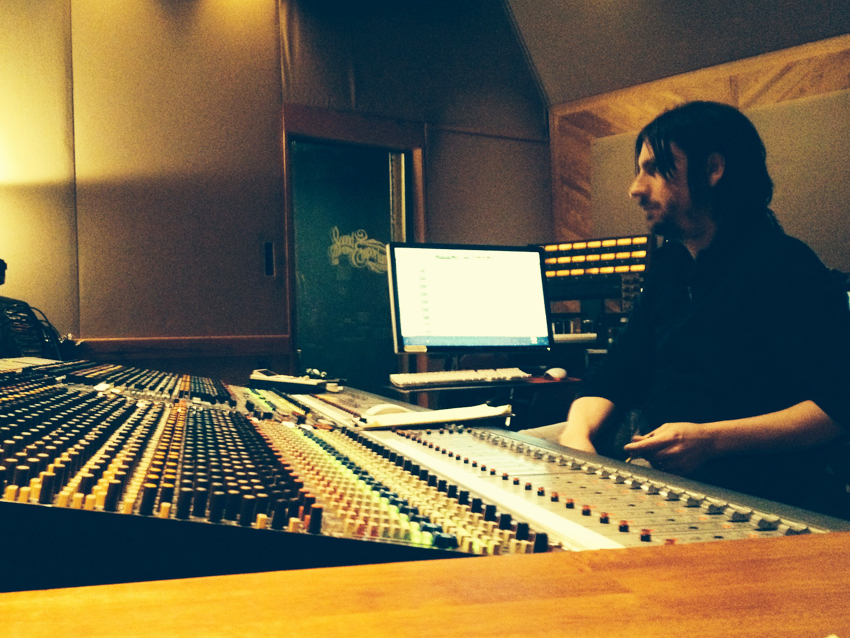
Dave Cobb, Nashville's hottest producer, talks "sound purity"
Former Drive-By Trucker singer-songwriter Jason Isbell was the big winner at last month's Americana Music Honors & Awards ceremony held in Nashville, taking home hardware for Top Artist, Song Of The Year (Cover Me Up) and Album Of The Year for Southeastern. That album's producer, Dave Cobb, didn't fare too badly, either, nabbing Producer Of The Year honors.
Isbell is just one of the latest in a growing number of artists who have benefited from the unobtrusive production skills of the Savannah, Georgia-born Cobb, whose West Nashville home also double as his studio. In the past few years, Cobb, a dedicated rock 'n' roller who counts The Beatles, The Rolling Stones and Led Zeppelin as major influences, has helmed celebrated releases by acts as disparate as Sturgill Simpson, Jamey Johnson, the Rival Sons, the Oak Ridge Boys and California Breed. And then, of course, there's his longstanding collaboration with alt-country star Shooter Jennings (son of Waylon), whom Cobb calls "a brother, friend and ally. I wouldn't be where I am today without him."
Calling himself "a student of rock's golden period, the '60s and '70s," Cobb has bucked current Nashville trends that have seen an increasing number of high-profile (and chart-topping) acts incorporate EDM textures and hip-hop beats to their records. "I'm not one for jumping on bandwagons," he says. "When an artist or band comes to me, they're looking for honesty and integrity. I love records that have an undeniable but mysterious quality to them. Take Traffic’s Dear Mr. Fantasy – where did that even come from? You can’t describe why you like the song so much, but you know that it has its own feel and vibe. You wanna listen to it again and again.
“Same with Glen Campbell’s Wichita Lineman," he continues. "It’s just takes you away; it’s got a quality unlike anything else. Anything I produce, I try to give it that intangible feel, something you’re not gonna get from any other record.”
Cobb sat down with MusicRadar recently to talk about his approach to production, his studio gear and who sits high on his wish list of artists he'd like to work with.
When you decide to work with an artist, what's the main thing you look for?
“Number one is the voice. That’s what people respond to the most – the singer is everything. Obviously, there have been some great bands where the singer is just OK, but I think the vocalist is the first thing that people listen to. I’m really into great voices. With me, my main requirement is a fantastic singer. If you've got that, everything will fall into place.
“But there has to be a sense of individuality to the singer. A lot of people can sing great, but they don’t make you feel anything. So you can be a technically not-great singer, but you might have something about you that works. Look at Leon Russell: He’s got a weird voice, but he’s got style, a sort of definitive thing about him; he puts a song across like nobody else. So that’s what I’m looking for, somebody who has a story in their voice.”
We talked a little about country artists adding shades of hip-hop and EDM to their songs. You're not a big fan of this trend.
“Well, you know, I don't want to mention names, but I just hope that honesty will prevail over... vanilla. [Laughs] It’s kind of a loaded question. I think people know real music when they hear it; it impacts them differently than stuff that is factory-made and put together. I don’t some of that stuff will have longevity. People probably won’t be buying that stuff years from now. I don’t know what to say about some of that stuff, other than it’s not for me. I’m into sound purity, which isn’t to say that you can’t add new sounds, because you can; I just think there’s a big element of authenticity that’s missing from some records.”
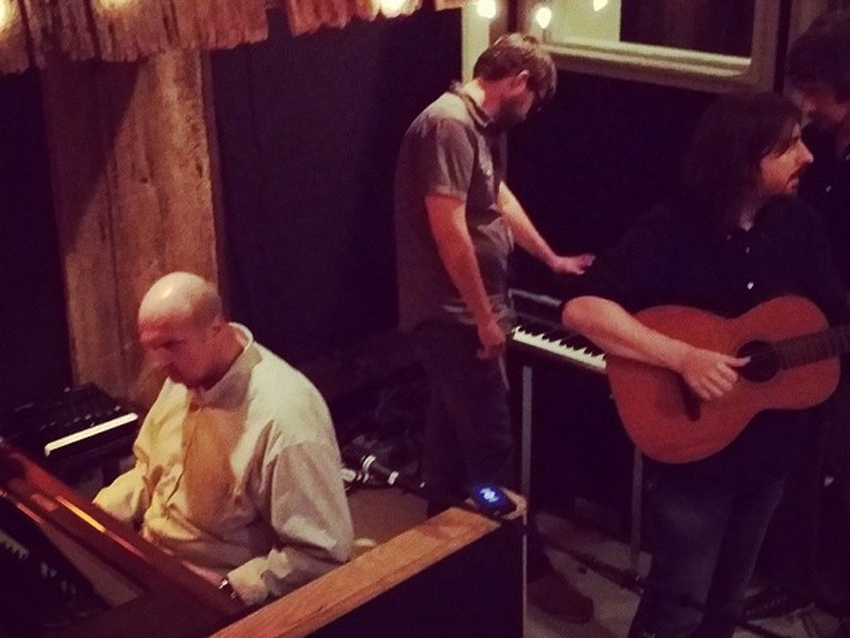
His production ethos
Above photo: Cobb (right) in the studio with (from left) Hargus "Pig" Robbins" and Adam Gardner
You mentioned Traffic's Dear Mr. Fantasy and Glen Campbell's Wichita Lineman –
"Those are just a couple that came to mind. There's tons more." [Laughs]
Of course. But what's great those those records is, you don’t hear the craft involved. The music just seem to exist.
“I agree with that 100 percent. When somebody calls me to produce a record, I try to make it sound different from anything they’ve done or what anybody else might have done. That’s intentional to a large degree. When I sit down with an artist for the first time, I try to find out what they’re all about. What do they do? How do they play, how do they sing? How can we get a new kind of feeling on this record? But it’s gotta be real and true and… timeless.
“That’s not to say I don’t listen to what people have done; there are timeless records to pick from and draw from. Everything from turn of the century mountain songs and chain gang songs to ‘50s Nashville, ‘60s British rock and ‘70s rock ‘n’ roll – there’s a lot of great influences to draw from. The records I make are almost like combinations of other records, all mixed up in a way so that they sound fresh – I hope.” [Laughs]
A lot of rock producers set up shop in Nashville in the last 20 years, but their style owes more to ‘80s rock – even hair metal, with shredding guitar. Your rock influences stretch further back.
“I’m an equal parts fan of the Rolling Stones and Little Richard. Those early Little Richard records, those things were dangerous. He was scary! [Laughs] It was so radical. Sure, if you listen to Good Golly Miss Molly now, you might think, ‘Oh, that’s just old rock ‘n’ roll,’ but at the time, it was revolutionary. He was on fire – he scared the crap out of people. His vocals are heavier than Black Sabbath. There's danger in that stuff.
“I definitely love and take bits from The Beatles and the Stones and Zeppelin, but at the same time, I go back to early rock ‘n’ roll. Elvis, Chuck Berry, Little Richard. I love Stax and Motown, as well. I’m attracted to dangerous music, which doesn’t mean it has to be hard and fast – it can be something pretty, too. Listen to Chuck Berry sing Wee Wee Hours. It’s devastating and dangerous, even though it’s quiet and stripped down.”
I don’t hear any kind of artificial or overly stylized production aesthetic on the records you make. It’s a fine line, though, to let artists be themselves while guiding them, molding them in some way…
“Yeah, sure. The albums might sound very natural, like I just sit back and hit ‘record,’ but I’m very involved in everything. The feel, the sound and the overall concept – I'm in there. And I play on every record, so I become a member of the band in a lot of ways. I play guitar most of the time; sometimes I’ll do percussion. I take that from Jimmy Miller – he produced Sticky Fingers and Exile On Main St. and lots of awesome records. His whole thing was to set the vibe, and he’d play tambourine or shaker to sort of find the pocket.
“I love the Stones, so I wouldn’t talk crap about them before or after Jimmy Miller, but I don’t think they had that swagger until they started working with him. Before him, they didn’t have it, and after him, it’s like he took it with him. They were a different band with Jimmy. The period from Let It Bleed through Exile was when they had that thing about them that I consider to be quintessential Rolling Stones.”
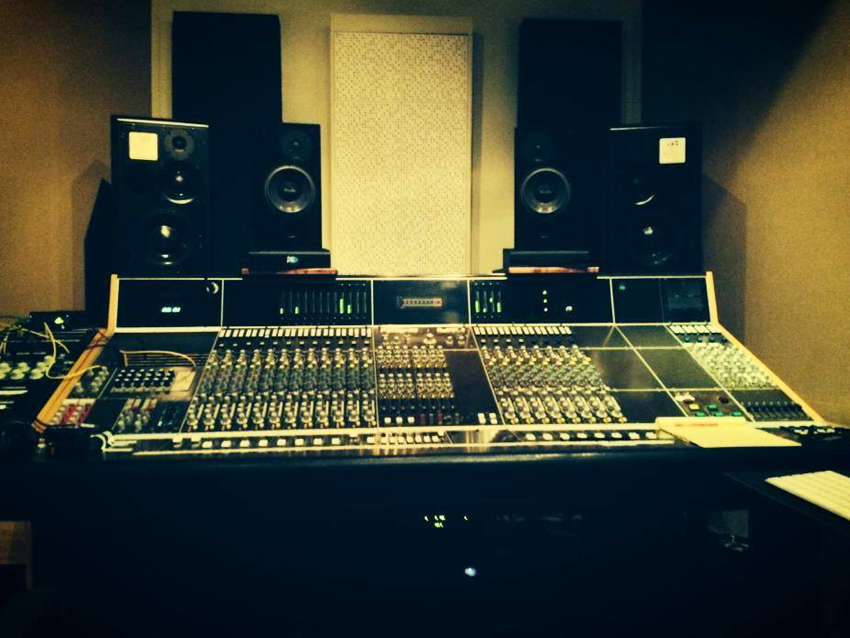
Cobb's Helios console with ProAc Studio 100s and ATC 50s
As you said, you do play on the records you produce. Now, you used to be in bands – is that where you saw your career at one point, as an artist?
“For sure. I was in bands growing up, and I definitely wanted to get signed and go on the road, all that stuff. I did get in a band that got a record deal – that was the Tender Idols. We made a record; I didn’t produce it, but I recorded it. Our record deal was a really bad one, and we couldn’t get out of it. But since I was already interested in the recording end of things – being in the studio was my absolute favorite part of making music – I just started recording my friends. I didn’t want to be on the road anymore. I’d met the woman who would become my wife. I just wanted to stay home and make records.”
So the transition from band guy to producer was relatively seamless.
“It was. I had to make the choice, though: ‘Am I a band guy or am I really gonna be a producer?’ Some guys can do both. Jack White can be an artist and do what he does with other people, although I don’t know if he’s produced a full album for somebody else. It’s a lot of work. I couldn’t try to have the dual career that he has or a guy like Dan Auerbach, what he’s doing.”
You work mostly out of your home studio. What kind of setup do you have? Is it mostly analog gear?
“Sort of – it’s a mix. I’ve been a gear dork since day one. Before it was recording gear, it was band gear. I started off on drums, so I’ve got drums and then I’ve got everything else – guitars, basses, keyboards, you name it. I’ve settled on a vintage Helios console, a Stephens 16-track machine, and a bunch of Decca compressors and crazy UA compressors. Lots of old stuff – vintage Neumann mics, a lotta ribbon mics. It’s super dorked-out. [Laughs]
“I’m a big fan of Glyn Johns. The records that he made, whether it was by the Stones, the Who or Zeppelin or whoever, they were so beautiful sounding. I started analyzing them, and I found that he’d recorded most of them on a Helios console. I sought out a Helios and I found one. It took a long time, but it was worth it.”
On so many of those records that Glyn Johns produced, he always made sure that you heard the room sound.
“Totally. It’s like the room was part of the record. You hear humans playing together without an artificial metronome guiding them; and whatever was guiding the band, whether it was an acoustic guitar or the drummer, that’s what you hear. That’s what you’re supposed to hear.”
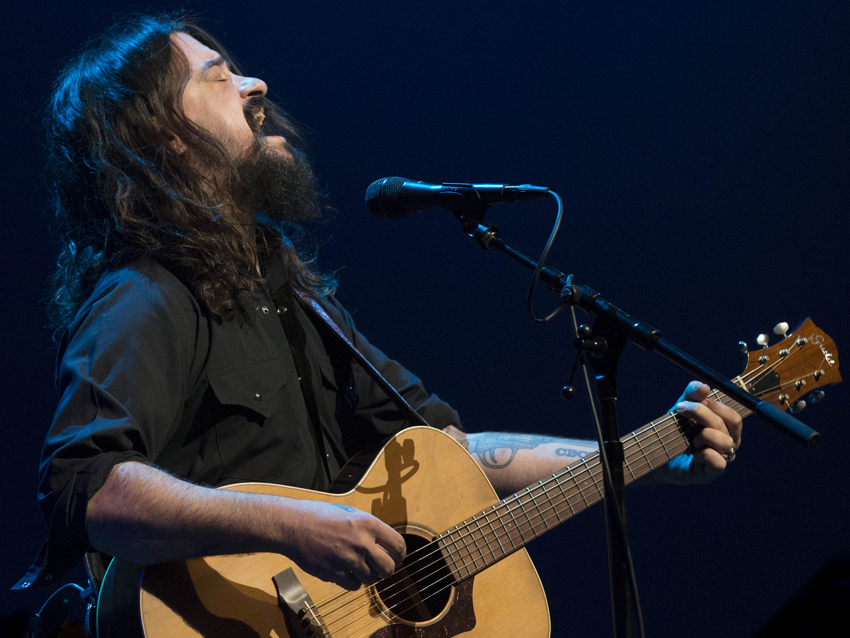
On meeting Shooter Jennings
You do use Pro Tools for storage, though, I assume.
“As a storage medium, right. Today, unfortunately, even on major-label stuff, nobody is going to give you a $30,000 tape budget anymore. I hate the new-school pre-production approach, where bands go in for two weeks or a month and work out the songs; then they go out and play on the road for another month. By the time they get into the studio, they hate the songs. [Laughs] That just sucks all the life out of everything, in my opinion.
“I like to go in pretty cold. Maybe the band has a song or two, but not much else. The Rival Sons records are 100 percent written in the studio. There’s zero riffs when they walk in, and 18 days later they walk out with a finished record. I love the idea of rolling tape as a song it being written. By the time you get that second or third take, you have something really cool and inspired. And even if you work out some other parts of the song later, they can be popped into that master take.
“Unfortunately, you can’t do that with tape alone these days; you’d have a mountain of tape if you were just rolling and rolling as songs were being written. So I do work the old way, recording onto tape, but I store onto Pro Tools. I use CLASP for that – I was one of the first people to get a CLASP unit.”
One of your first, and most important, collaborations was with Shooter Jennings. He helped expose you to a lot of country music, didn’t he?
“He did, he did. I was born and raised in George, and my parents listened to country, but it wasn’t the kind of country I liked. I was into rock ‘n’ roll, so I kind of ran away from country. I ran all the way to California. [Laughs] When I got to California, I meet Shooter through my manager, Andrew Brightman. He just thought we’d get along, and we did. Right away, Shooter and I started talking about Nine Inch Nails and Skinny Puppy, not country at all.
“Then we went in to make a record, and he started playing me all of these country records, and I just fell in love with ‘em. He taught me everything about country. There’s no way I’d be in Nashville today without Shooter Jennings. We did a record that did pretty well, and then he introduced me to Jamey Johnson. He and I did a record that did pretty well. Then he introduced me to the Oak Ridge Boys. I should give Shooter a commission." [Laughs]
Now, you produced the Oak Ridge Boys. I’m curious – how did you get them to do a White Stripes song?
“Shooter had them on one of his songs that we did, and we had a really great time together. So they called me and said that they wanted to do something different. They wanted somebody crazy to make their record, so I guess I was the guy. [Laughs] I was trying to think of the wildest things for them, but you know, it still had to make a little sense – it had to sound like them. When I talked to them about doing Seven Nation Army, they were very intrigued. They had never heard the song before – they didn’t know anything about the White Stripes – but they went in and just killed it. It’s unbelievable. We had a fantastic time. Those guys are gonna be friends for life.”
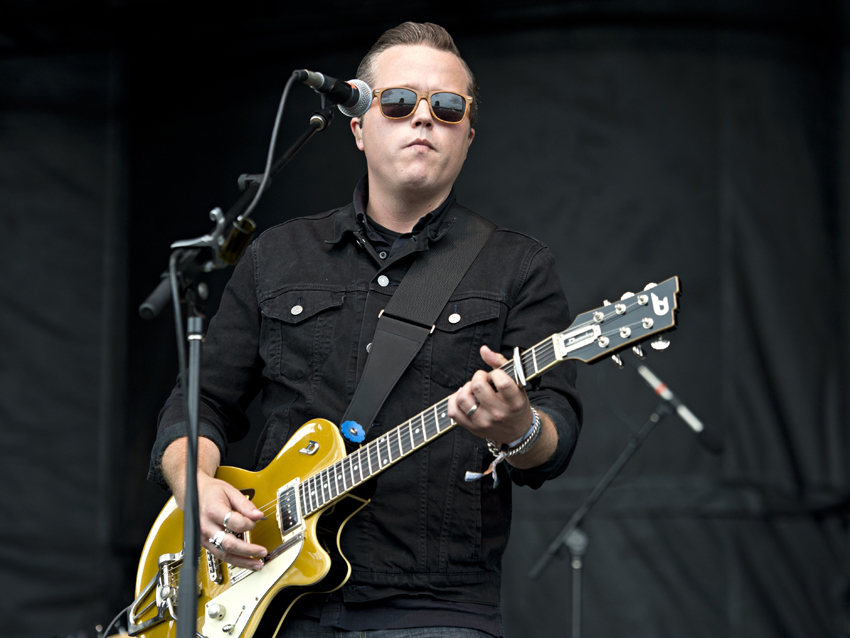
Working with Jason Isbell
Jason Isbell's Southeastern has been such a success. What was it like working with him?
“I’ve been chasing Jason for quite a while, actually. I just think he’s an incredible lyricist. Ryan Adams was supposed to produce the record, which I thought would be a great combination because Ryan is so talented. But something happened – I’m not sure about the details on that – and it fell apart. I got a call about two weeks before we went in to make the record. The only thing we talked about was Simon & Garfunkel. Jason came over my house, and I played him the Bridge Over Troubled Water record, one of my favorites. He loved it. When he heard the song The Only Living Boy In New York, he said, ‘Well, shit, let’s start a record!’ [Laughs]
“The reason why I played him that record was because it sounded like a completely acoustic record. It feels like those two guys sitting with an acoustic guitar and singing those songs. Even though there’s a lot of production on it, it’s still so intimate. They’re singing backgrounds in a chapel, recording drums in an elevator shaft, and there’s all that beautiful symphonic stuff and weird sounds. But it’s still very personal.
“That’s what I wanted to do with Jason – a sort of solo shook-down acoustic record but not the kind of acoustic record that’s boring to listen to. He could have made an all-acoustic record, and it might have been great, but we wanted something more. I like the idea of the feeling of him sitting with an acoustic guitar, but there’s still all of that other stuff going on. Simon & Garfunkel did that, and that’s what I wanted to try. Roy Halee, who produced that Simon & Garfunkel stuff, he’s one of my heroes. Man, what a beautiful record – Bridge Over Troubled Water. It's a classic."
You also produced California Breed recently. As a Zeppelin fan, what was it like working with Jason Bonham?
“The guy’s unbelievable. He’s definitely a powerhouse monster player, just devastating in the studio. He’s got the Zeppelin thing going on, but I think he’s OK with it. He’s like, ‘Well, fuck it. I’m not my dad, but I’ll go in there and just rock it and make it feel good.’ He’s got that intangible ‘it’ as a drummer. So that was a blast. And Glenn Hughes, he’s another powerhouse. What a great singer. All the vocals on the record are live. Glenn didn’t know he was recording tracks – he thought he was just singing guides. After he was done, he said, ‘OK, I’m ready to sing the tracks for real,’ and I said, ‘You don’t have to, man. You did it already!’” [Laughs]
Anybody on your wish list to produce?
“Paul Rodgers. I love Free and Bad Company, and I think Paul Rodgers is just one of the best ever. Rod Stewart, Steve Marriott, Paul Rodgers – I love those real raspy, soulful rock ‘n’ roll guys. I’d love to work with Paul. He needs to make one more bad-ass rock ‘n’ roll record. It might be out of the realm of possibility, but hey, I can dream.” [Laughs]
Joe is a freelance journalist who has, over the past few decades, interviewed hundreds of guitarists for Guitar World, Guitar Player, MusicRadar and Classic Rock. He is also a former editor of Guitar World, contributing writer for Guitar Aficionado and VP of A&R for Island Records. He’s an enthusiastic guitarist, but he’s nowhere near the likes of the people he interviews. Surprisingly, his skills are more suited to the drums. If you need a drummer for your Beatles tribute band, look him up.
